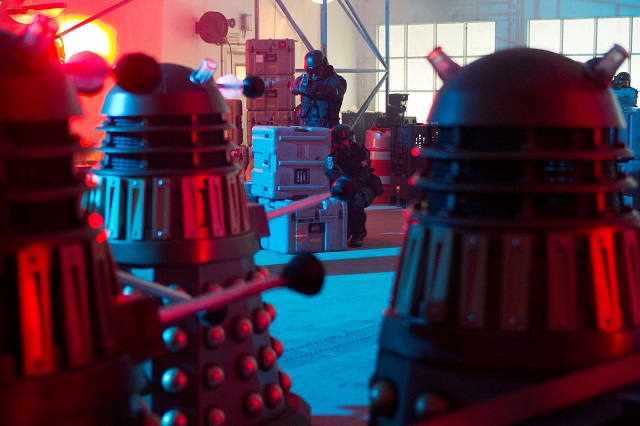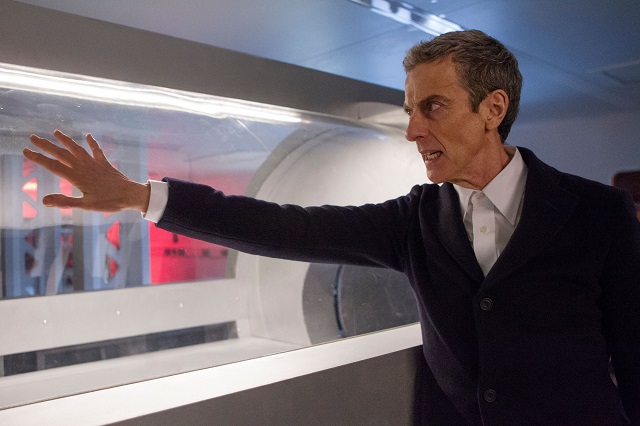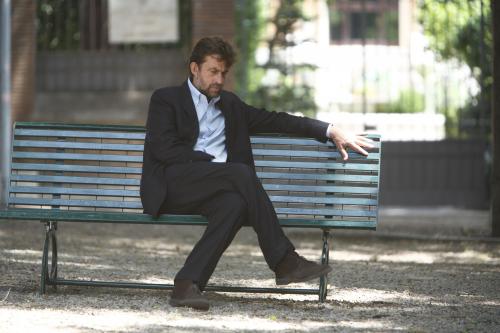 Doctor Who, Season 8, Episode 2, “Into the Dalek”
Doctor Who, Season 8, Episode 2, “Into the Dalek”
Written by Phil Ford and Steven Moffat
Directed by Ben Wheatley
Airs Saturdays at 9pm ET on BBC America
This week, on Doctor Who: The Doctor doesn’t like soldiers, Clara is a master of the quick change, and Mr. Pink is a reader
Dalek stories are tricky. As monsters, they’re one trick ponies, but they’re also iconic and massively popular, so they’re trotted out every season or so for the Doctor to face*. They’re the Doctor’s oldest enemy (the First Doctor faced off with them in his second story), and frankly, the series ran out of new ways to use them a very long time ago. In season one of NuWho, Robert Shearman revitalized the creatures with his fantastic script for “Dalek”, but since season two, their appearances have mostly been a series of diminishing returns, with the creative and visually interesting “Asylum of the Daleks” a welcome exception. “Into the Dalek” on the whole succeeds and is certainly the best Dalek story in quite a while, topping “Asylum” thanks to that episode’s dreadful and contrived (though well-acted) Amy/Rory conflict, but in the end it falls prey to the same struggle that has plagued Dalek stories for years: Doctor Who is unwilling to change the Daleks, and so has nothing new to say about them or the Doctor’s relationship with them.
*There may be rights issues that come into play with this decision as well—allegedly, the Daleks need to appear at least once a season, or the current contract with the Terry Nation (creator of the Daleks) estate goes up for renegotiation, something the BBC would rather avoid
Most of “Into the Dalek” works well. As a ClassicWho fan, the pacing of this episode is a breath of fresh air and a promising sign of what’s to come this season. The extra-long premiere also took a more relaxed approach, and it’s great to see that continued here despite episode two returning to the series’ usual runtime. Writers Phil Ford and Steven Moffat and director Ben Wheatley sit with the characters, holding on several key early moments and ensuring that the audience quickly understands and values the new additions as individuals, not just archetypes.
One of the absolute highlights this week is Clara and new coworker Danny’s first conversation. Their awkward exchange after Clara’s, “Ahh, you shoot people and then you cry about it afterwards” is a thing of beauty, because it’s played for honesty, not laughs. There’s no scoring underneath and no back and forth cutting, just two people and a bit of small talk that takes a turn. The same thing happens later, when the Doctor asks Clara, “Am I a good man?” and again, when Clara attempts to banter with Journey Blue, who’s really not in the mood. This willingness to embrace open communication, to give questions answers that the asker may not have wanted to hear, is wonderful and shows a new commitment to character that is hopefully here to stay.
 More important than these unexpectedly honest answers are the thought put into them. Clara doesn’t rush to answer the Doctor’s query, she reflects before speaking. It’s a complete change from her relationship with the Eleventh Doctor, and a badly needed one. So far, this seems to be the defining characteristic of the Twelfth Doctor. When Journey winds up on the TARDIS and demands to be returned, the Doctor simply says, “No, hey—not like that.” He doesn’t prompt her further, he forces her to slow down and think about what he means, to get outside of her own perspective. This Doctor doesn’t speak with Clara as the two clutch the TARDIS console; they sit on the stairs, look at each other’s faces, and have a heart-to-heart. In only their second story together, this Doctor and Clara feel like friends. New friends, certainly, but friends nonetheless, and it’s about damn time.
More important than these unexpectedly honest answers are the thought put into them. Clara doesn’t rush to answer the Doctor’s query, she reflects before speaking. It’s a complete change from her relationship with the Eleventh Doctor, and a badly needed one. So far, this seems to be the defining characteristic of the Twelfth Doctor. When Journey winds up on the TARDIS and demands to be returned, the Doctor simply says, “No, hey—not like that.” He doesn’t prompt her further, he forces her to slow down and think about what he means, to get outside of her own perspective. This Doctor doesn’t speak with Clara as the two clutch the TARDIS console; they sit on the stairs, look at each other’s faces, and have a heart-to-heart. In only their second story together, this Doctor and Clara feel like friends. New friends, certainly, but friends nonetheless, and it’s about damn time.
This Doctor waits until Clara gives her tacit approval before zooming her away from her life; the Eleventh Doctor would’ve taken off as soon as she came on board. For Eleven, Clara was a mystery in a too-tight skirt (a line of dialogue this critic shudders to think of to this day), someone he liked but certainly did not trust or treat with particular respect for most of their time together. For Twelve, she’s a confidante and Carer, and someone he knows he needs. Like Amy in “The Beast Below” and Donna in “The Runaway Bride”, in this episode Clara is there to stop the Doctor, to bring him closer to humanity and the compassion that can come with it. She performed admirably in the same role in “The Day of the Doctor” and should this become a trend, it’s an excellent use of the character. It’s been a very long time since the Doctor traveled with a teacher (his first Companions and two of his best ever, Barbara and Ian), and spending some time with one will be good for him.
There’s plenty more ClassicWho touches to this episode as well. The return to the old-school look of the Dalek rays (a negative effect, turning the victim’s skeleton dark and body light) may not be new here, but it’s very prominent and is a lovely touch for fans of the classic series. The Doctor’s intentional miniaturization is nothing new, having been the premise of the Fourth Doctor’s “The Invisible Enemy” (though several other Doctors wound up miniaturized against their will), but the idea is used well here and given a fresh coat of paint. Perhaps most significant is the climax of the episode, as the Doctor stands eye to eye with Rusty in an effects moment very reminiscent of classic sci-fi. It’s far from convincing, but that shouldn’t stop a good idea, and the core of “Into the Dalek” is definitely a good idea.
Where it falls down is in its climax and denouement. The notion that the Doctor is more Dalek-like than he’d admit is nothing new. It’s the devastating highlight of “Dalek”, powerfully played by Christopher Eccleston. It’s the subtext of “Journey’s End”, when Sarah Jane talks the Tenth Doctor down from destroying the entire Dalek race in a lovely counterpoint to and role-reversal of “Genesis of the Daleks”. And yet here, it’s played as a surprise. It’s supposedly a shock, when only an episode ago the Doctor mentioned to Clara that he’d done too much bad in the universe and needed to right some wrongs. Why would he be surprised that the Dalek sees hate in him, sees him as a Dalek, when that’s the only emotion the show has had him express toward Daleks since the Time War? It’s a fine beat to play, but a repetitious one, and one that’s lost most of its power.
 A more entertaining conclusion would have been one in line with the Doctor’s assessment that, “an anticlimax once in a while is good for my hearts.” Almost every Dalek story in NuWho ends with massive explosions and untold casualties (of nameless extras, as here—the one human outside the Dalek that the audience has any connection with is inexplicably safe despite barely taking cover). By making the Doctor obsessed with the Daleks and hell-bent on their destruction, the writers have painted themselves into a corner where every Dalek story must use them as an obvious enemy or a potential ally that turns out to be a treacherous traitor in the end (see “Victory of the Daleks”). The Daleks never change, and so the Doctor’s relationship with them doesn’t change, and every episode winds up repeating the same story. “Into the Dalek” manages to make the scenery interesting and changes up the dynamic somewhat, but in the end it squanders this potential and ends on a disappointing note.
A more entertaining conclusion would have been one in line with the Doctor’s assessment that, “an anticlimax once in a while is good for my hearts.” Almost every Dalek story in NuWho ends with massive explosions and untold casualties (of nameless extras, as here—the one human outside the Dalek that the audience has any connection with is inexplicably safe despite barely taking cover). By making the Doctor obsessed with the Daleks and hell-bent on their destruction, the writers have painted themselves into a corner where every Dalek story must use them as an obvious enemy or a potential ally that turns out to be a treacherous traitor in the end (see “Victory of the Daleks”). The Daleks never change, and so the Doctor’s relationship with them doesn’t change, and every episode winds up repeating the same story. “Into the Dalek” manages to make the scenery interesting and changes up the dynamic somewhat, but in the end it squanders this potential and ends on a disappointing note.
The Daleks aren’t going anywhere, but with massive Whovian Peter Capaldi’s Dalek story out of the way, they’ll hopefully go on hiatus for a while and take their tiresome plot retreads with them, leaving behind the significant structural and character-based improvements demonstrated here. It would seem many of the season eight premiere’s most prudent choices are here to stay; only two episodes into the Twelfth Doctor’s tenure, there’s already a lot to be excited about.
Kate Kulzick
Other thoughts:
—The clean lines of the Doctor’s new suit stand out strikingly when he’s next to the soldiers in this episode. He instantly doesn’t belong in a way that none of the other NuWho Doctors’ distinct and appropriate-to-their-Doctor looks quite captured.
—Wheatley’s direction takes advantage of several memorable visuals, but by far the standout is the absolutely gorgeous shot of the Doctor, Clara, and the soldiers coming in through the Dalek’s eye stalk. Mr. Wheatley, interested in directing more of this critic’s favorite TV? How about some Hannibal?
—Peter Capaldi is a fantastic actor, but even he can’t make the Doctor’s speech about hate and love, clearly filmed with a solo Capaldi sitting in front of a green screen, work.
—The opening of the episode is very over the top Star Wars, but thankfully the score goes for an interesting electronic or keyboard sound instead of the expected orchestral or brass sound. The scoring throughout the episode is done with a light hand this restraint adds tremendously to the experience.
—A quick word to Steven Moffat: Men hitting women is not okay. Women hitting men, also not okay and certainly not funny, as you seem to think it is. Please stop having your characters hit each other as if this is acceptable behavior.
—There are many great lines in this episode. One of my favorites goes to Journey, when asked who her special person is, “My brother. But he burned to death a few hours ago, so he’s really letting me down at the moment.”
—The Doctor may say he doesn’t like soldiers, but several of his best Companions have been soldiers or warriors. To name only a few: Jamie, Leela, The Brigadier, Captain Jack, and Wilf. And then there are the Companions who basically became soldiers after traveling with him for a while: Rose, Jackie, Pete, Mickey, and Martha. There are better ways to set up Danny eventually joining the TARDIS team than having the Doctor all of a sudden not be okay with soldiers.
—Gotta love that Clara basically Fonzies the Dalek into recovering its memories.



